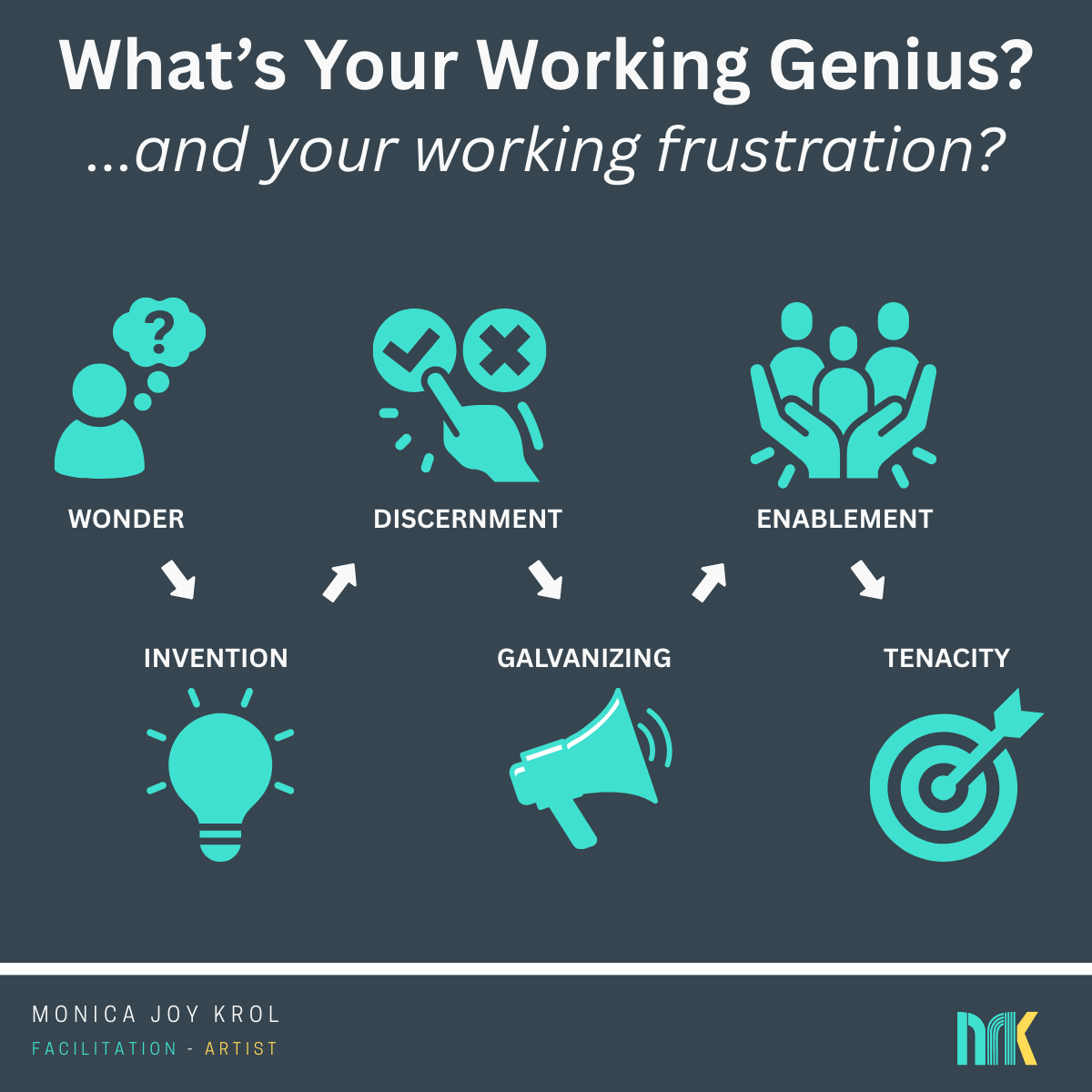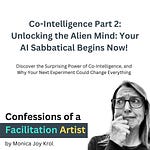Welcome back to Confessions of a Facilitation Artist! I’m Monica Joy Krol, and I’m thrilled to kick off a new series exploring Patrick Lencioni’s The Six Types of Working Genius. After our deep dive into The Coaching Habit, I wanted to continue this book club-style journey with a framework that’s been a true game changer for me and my team.
What does genius mean to you? Is it creativity, intuition, motivation, support, or the drive to finish strong? I’d love to hear which “genius” you thrive in or where you want to grow! In this series, I challenge you to break from the traditional icons and motifs and explore with me.
Why This Book and Framework Are Helpful
The Six Types of Working Genius offers a refreshingly practical approach to understanding how we work best. Unlike other assessments that can feel overwhelming or abstract, this model is simple, actionable, and focused on what energizes you-not just what you’re good at.
The framework helps you:
Identify Your Innate Talents: It pinpoints the types of work that give you energy and satisfaction, which is key to finding more joy and meaning at work.
Boost Team Collaboration: By recognizing each person’s unique contributions, teams can assign roles and tasks that play to everyone’s strengths, leading to better outcomes and less frustration.
Enhance Productivity and Engagement: When people spend more time in their “genius” zones, they’re more productive, efficient, and fulfilled.
Address Team Gaps: Using tools like the Team Map, you can spot missing geniuses in your group and fill those gaps for smoother, more effective teamwork.
Foster a Supportive Culture: Open conversations about strengths and frustrations help create a workplace where everyone feels valued and understood.
Personally, I was introduced to this framework through a LinkedIn challenge I coordinated for the AJ&Smart Facilitator Pro community. Shout out to Tracy Winkler, who brought this framework to my attention! Seeing how it resonated with facilitators and leaders, how it gave me language for why I felt stuck or energized at work, and made me realize its potential for transforming teams and individual careers.
What Are the Six Types of Working Genius?
The six types spell out the acronym WIDGET:
Wonder - Big-picture thinkers who question the status quo and envision new possibilities
Invention - Creative problem-solvers who generate novel ideas and solutions.
Discernment - Evaluators who use intuition and judgment to assess ideas and provide feedback.
Galvanizing - Motivators who inspire and rally teams into action.
Enablement - Supporters who encourage and assist others, fostering collaboration.
Tenacity - Finishers who push tasks through to completion and ensure successful outcomes.
Each of us has two “working geniuses” (where we thrive), two “competencies” (we can do, but they drain us over time), and two “frustrations” (work that depletes our energy). For example, my top genius is Invention-I love generating new ideas and solutions-while Wonder is a working frustration for me. I’ve learned to appreciate colleagues who thrive in Wonder, even when I’m eager to move on to action.
How to Use the Framework for Team Development
Here’s how I’m applying this with my team-and how you can, too:
Identify Strengths: Have everyone take the assessment (it’s $25, and worth it!) or self-identify their likely geniuses. This helps each person understand where they shine and where they might get drained.
Strategic Collaboration: Align project phases with team members’ geniuses. For example, use Wonder and Invention for brainstorming, Discernment and Galvanizing for vetting and launching ideas, and Enablement and Tenacity for execution.
Address Gaps: Use a Team Map to spot missing geniuses. For instance, if your group is low on Invention, bring in someone from another department or adjust your approach to fill that gap.
Foster Open Dialogue: Encourage team members to share not just their strengths but also their frustrations. This builds empathy and helps everyone understand why certain tasks feel draining.
Redesign Meetings: Structure agendas to match the phases of work (ideation, activation, implementation) and the geniuses needed for each phase. This prevents the “meeting whiplash” of jumping between big ideas and detailed execution without warning.
For example, I’m about to run a team retreat where we’ll map out everyone’s geniuses and experiment with assigning tasks and projects based on those strengths. I’m excited to see how this will improve our collaboration and make our meetings more focused and energizing.
What’s Next in the Series
This episode is just the beginning! Over the next few weeks, I’ll share stories from my own facilitation experiments, lessons learned from applying the Working Genius model, and practical tips for making your meetings and projects more effective. We’ll look at real-life team dynamics, workshop anecdotes, and ways to use this framework to create more joy and impact at work.
If you’re curious, you can read along with me or take the assessment yourself. And if you do, let me know what your top geniuses are - I’d love to hear your stories and questions as we explore this together.
Stay tuned for the next episode, where I’ll break down how our team retreat unfolds using the Six Types of Working Genius in action. Let’s keep learning, experimenting, and building teams where everyone gets to do more of what they love!
Want a FREE 2-Hour Working Genius Workshop for your team?
I’m so passionate about this framework that I’ve decided to pursue Working Genius certification so I can bring these workshops to more teams. In fact, if you’re interested in a custom Working Genius workshop for your team, I’m offering a special opportunity: pledge as a founding member, and I’ll facilitate a FREE two-hour virtual session for your group in 2025 (you just cover the assessment costs for participants).
If you want to pledge your support as a founding member, start by entering your email below and click Subscribe! This will guide you to the options!
If you’re curious about how this framework could transform your team, or want to sponsor a session for another organization, please reach out!

















Share this post